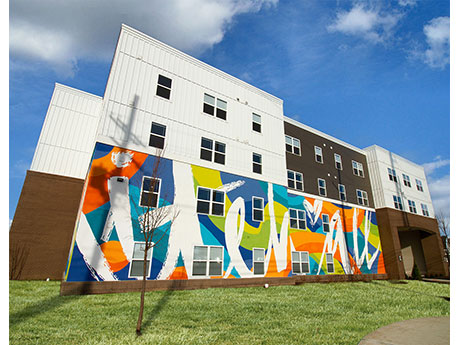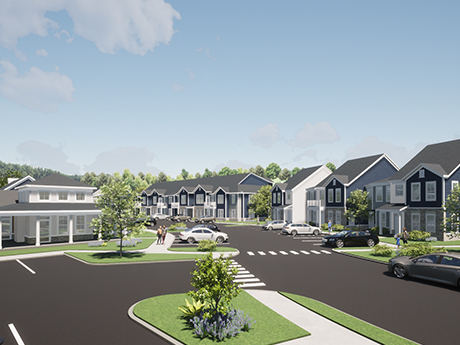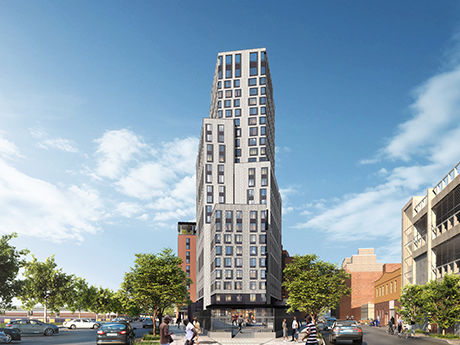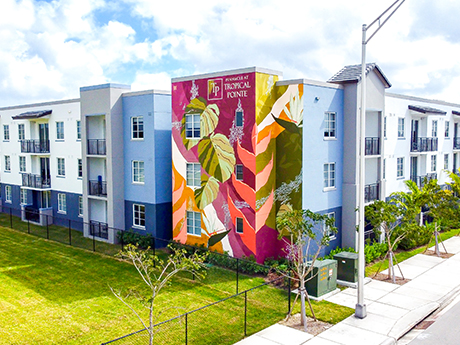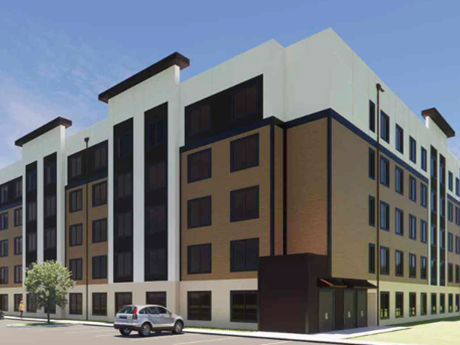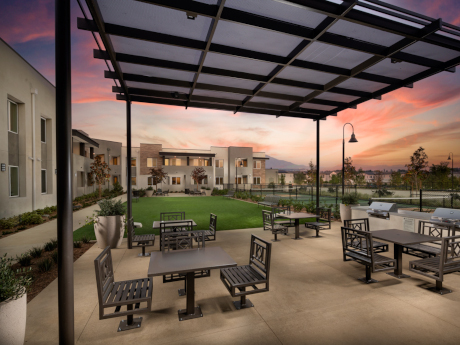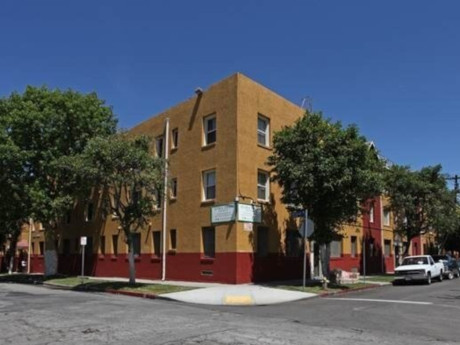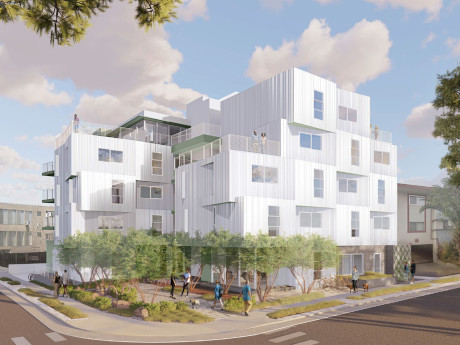WASHINGTON, D.C. — Colliers Mortgage has arranged a $5.7 million HUD-insured loan to refinance Stanton Park Apartments, a 62-unit affordable housing community located in Washington, D.C. As part of the refinance, the Non-Profit Community Development Corp. of Washington, D.C. (NPCDC) has obtained an extension for its use restriction to preserve its affordable housing options while operating under the Low-Income Housing Tax Credit (LIHTC) program. The HUD loan features a 35-year term and amortization schedule. Stanton Park Apartments comprises three one-bedroom units, 42 two-bedroom units and 17 three-bedroom units. Laundry facilities are located in each building, while disabled-accessible units contain an in-unit washer/dryer. Additional amenities at the property include barbecue and picnic areas and onsite parking.
Affordable Housing
WHITEHALL, OHIO — Woda Cooper Cos. Inc. and co-developer IMPACT Community Action have opened The Enclave in Whitehall, six miles east of Columbus. The 102-unit affordable housing community is located at 3540 E. Main St. The $29.9 million development is reserved for renters who earn between 30 and 80 percent of the area median income. Rents range from $435 to $1,240 per month, depending on income restriction and size of unit. The City of Whitehall approved a Payment in Lieu of Taxes related to the real estate taxes for 15 years on 100 percent of the residential improvements. The development also received significant support from Franklin County. The Board of Commissioners approved a permanent mortgage loan through its Magnet Fund program. The project also benefits from a $25 million linked deposit fund created by the Franklin County Treasurer Brooks Sullivan. The four-story building features a large mural created by Ohio-based muralists Lucie Shearer and Thom Glick. Units at The Enclave offer one-, two- and three-bedroom layouts. Several units are adapted for those with mobility challenges and/or sight and hearing disabilities. Amenities include a community room with kitchenette and management office. The development is certified LEED Gold. The project also features …
GALLOWAY, N.J. — Locally based developer Walters is underway on construction of Phase I of Cornerstone at Galloway, a project in southern coastal New Jersey that will deliver 66 affordable housing units to the local supply. Residences will be furnished with full-size washers and dryers and fully equipped kitchens, and amenities will include a multipurpose clubhouse with a fitness center, as well as a children’s tot lot, basketball court and computer workstations. Cornerstone at Galloway will ultimately offer 198 units in one-, two- and three-bedroom floor plans that will be developed across two phases and will be reserved for households earning 60 percent or less of the area median income.
NEW YORK CITY — A partnership between locally based owner-operators, The Hudson Cos. and BRP Cos., has received $343 million in financing for Phase II of La Central, a multifamily project in the South Bronx that will add 420 affordable and supportive housing units to the local supply. The second phase will encompass Building C (166 units) and Building E (254 units), which will rise 13 and 26 stories, respectively, and house one-, two-, three- and four-bedroom units that will be reserved for households earning between 30 and 80 percent of the area median income. In addition, Phase II, which is slated for a 2028 completion, will include 1,567 square feet of commercial space, 13,000 square feet of community space and 7,134 square feet of public garden space. Building C will be constructed to meet Passive House standards, operating entirely on electricity to eliminate carbon emissions, while Building E will be built to achieve LEED Gold certification. Following completion of Phase II, La Central will comprise more than 1,000 units across five buildings. Buildings A and B, which opened in 2021, house nearly 500 affordable apartments between them, and Building A is also home to a YMCA. Building D, completed …
PRINCETON, FLA. — Miami-based Pinnacle has opened Pinnacle at Tropical Pointe, a new 215-unit affordable housing community located at 25155 S.W. 136th Ave. in Princeton, a city in south Miami-Dade County. The property features a mix of one- to four-bedroom apartments spread across six garden-style buildings, with amenities including a swimming pool, fitness center, business center and a playground. The community is designated for households earning up to 60 percent of the area median income. Pinnacle’s capital partners on the project included Bank of America, the Florida Housing Finance Corp., Miami-Dade County and Citibank.
Green Mills Breaks Ground on $26M Affordable Seniors Housing Community in Central Florida
by John Nelson
OSCEOLA COUNTY, FLA. — Green Mills Group has broken ground on a $26 million affordable seniors housing community in unincorporated Osceola County. Dubbed Poinciana Parc, the midrise property will comprise 86 units and amenities including a fitness center, business center, club/game room, laundry room and a swimming pool. The Florida Housing Finance Corp. awarded the project a 9 percent tax credit allocation in May 2023. Additional capital partners on Poinciana Parc include TD Bank, Raymond James Affordable Housing Investments and Neighborhood Lending Partners.
C&C Development, Riverside Charitable Corp. Open Affordable Seniors Housing Community in Lake Forest, California
by Amy Works
LAKE FOREST, CALIF. — C&C Development and Riverside Charitable Corp. have opened The Meadows Senior Apartments in Lake Forest, an affordable housing community for residents 62 years and older. Located within Toll Brothers’ Meadows master-planned community, The Meadows Senior Apartments offers 65 units designed for seniors earning 30 percent to 60 percent of the area median income (AMI). The two-story building offers units ranging in size from 600 square feet to 800 square feet, all of which are ADA-accessible and adaptable. The property offers community space with grassy areas, verandas and pickleball courts and a common amenity space with a kitchen, laundry room, leasing office, supportive services manager office and outdoor verandas with a barbecue pavilion. The property is also located adjacent to a community park and dog park. Residents will receive onsite supportive services from LifeSTEPS. Services will consist of educational classes and health-and-wellness programs. Financing for The Meadows consists of LIHTC (low-income housing tax credit) funding through the California Tax Credit Allocation Committee, California Debt Limit Committee and California Statewide Communities Development Authority. Bank of America also provided a construction and permanent loan. Additional financing was provided by the City of Lake Forest, The County of Orange, Calif., OC …
LOS ANGELES — Community Preservation Partners (CPP) has purchased Witmer Manor, an affordable housing property in Los Angeles. Located at 1501 Miramar St. in Los Angeles’ Westlake neighborhood, Witmer Manor comprises eight three- and four-story, elevator-served buildings containing 142 studio and 96 one-bedroom units. Common area amenities include a laundry room and an onsite property management office. CPP is partnering with LifeSTEPS to provide onsite adult education, health-and-wellness and skill-building classes and services to residents. Originally built in 1930, the property was most recently renovated in 2005. CPP’s total development investment is approximately $64 million, which includes the purchase price of $48.4 million and estimated renovation costs of approximately $65,000 per unit. Planned renovations include extensive ADA upgrades; exterior upgrades with new roofing, energy-efficient windows, upgraded heat pumps and LED lighting; and interior upgrades with kitchen updates, new vanities, new flooring, LED interior lighting, fresh paint and essential drywall repairs. Additionally, bathrooms will be upgraded with modern fixtures and replacements and new blinds. Renovations are slated for completion in early 2026. Dedicated to serving residents through the Section 8 program, all units will be income-restricted to family households earning between 30 percent to 60 percent of the area median income (AMI). …
EAH Housing Starts Construction of 48-Unit Affordable Housing Development in West Hollywood
by Amy Works
WEST HOLLYWOOD, CALIF. — EAH Housing has commenced construction for Lexington Gardens, an affordable housing property in West Hollywood. Located at the corner of Detroit Street and Lexington Avenue, Lexington Gardens offers 47 studio apartments ranging in size from 383 square feet to 447 square feet and one two-bedroom, 869-square-foot manager’s unit, all with energy-efficient appliances, window coverings and walk-in closets. The five-story community will serve families and individuals earning 30 percent and 60 percent of local area median income (AMI). Designed by DE Architects and built by Walton Construction, Lexington Gardens will offer a range of indoor and outdoor amenities, including onsite vehicle and bicycle parking, a community room, shared open spaces, laundry and a dedicated management office. EAH Housing will also provide resident services through an onsite resident services coordinator and collaborate with local organizations to offer specialized programs aimed at enhancing residents’ well-being.
Fairstead Invests $10M for Renovation of Affordable Housing Community in Chesapeake, Virginia
by John Nelson
CHESAPEAKE, VA. — Fairstead has invested nearly $10 million for the renovation of Peaceful Village Apartments, a 65-unit affordable housing community located at 3000 Welcome Road in Chesapeake. Fairstead is partnering with the Chesapeake Redevelopment and Housing Authority, which manages the community, for the renovation through HUD’s Rental Assistance Demonstration (RAD) program. The overhaul will include new energy-efficient appliances, renovated kitchens, new exterior siding and the construction of a new community center. All renovations are expected to be complete by fall 2026. Built in 1995, Peaceful Village offers a mix of three- and four-bedroom townhomes reserved for households earning below $32,000 annually to $63,900 (60 percent of the area median income). Capital partners on the renovation include Berkadia, Freddie Mac, U.S. Bank and Woodforest Bank.


